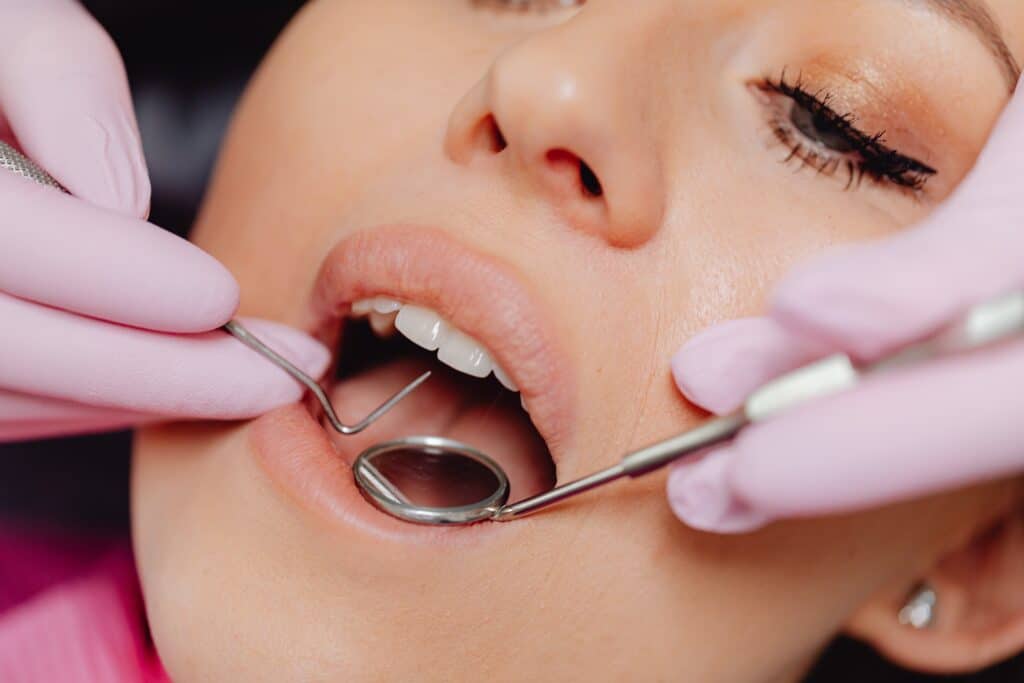The correlation between sugar and tooth decay is certainly well-known, but there’s still much to say when discussing sugar and proper preventative oral care. Since tooth decay can cause detrimental consequences to both our physical and mental health, it’s important to be aware of how it happens and why. By analyzing how sugar leads to cavities, we can learn more effective measures to prevent tooth decay and safeguard the health of our mouth and smile.
Understanding How Sugar Leads to Cavities
We’ve all heard it before: “Don’t eat too much candy and junk food because sugar leads to cavities!” And no matter who was telling you this, they weren’t wrong. In fact, consuming large amounts of sugar can do more damage than just cause cavities. Here are the main reasons why sugar is bad for your dental health:
- It’s a Matter of Bacteria – Our mouths are filled with bacteria, some beneficial and some harmful. Consider the mouth as a battleground, where these bacteria are battling for control. Various studies indicate that sugar causes this harmful bacteria to produce acid within the mouth, which in turn eats away at our teeth’s enamel and causes cavities. While saliva can combat this formulation of acid, a heavy influx of sugar will give the harmful bacteria a boost, and the integrity of our teeth will pay the price as a result.
- Sugar Attracts Bad Bacteria – Sugar also attracts other bacteria that can be linked to conditions such as gingivitis and gum disease, which can cause our gums to recede from our teeth.
- Bacteria Leads to the Buildup of Plaque – The two main types of harmful bacteria in our mouths actually feed on sugar and thus cause plaque to form. When this sticky substance is allowed to accumulate on our teeth, it becomes acidic and eats away at the enamel, again causing cavities.
- Steer Clear of White Processed Sugar – Some foods that are high in processed sugar can cause damage by creating a sticky residue that is too strong for saliva to clear out. This is one of the main reasons why brushing your teeth, flossing, and using fluoride are integral ways to prevent tooth decay, as only these methods can clear out this residue.
- Sugary Drinks Leave Their Mark – Sugary drinks do their own damage to our teeth, especially due to their acidity levels and the presence of high fructose corn syrup. The latter substance is particularly detrimental to our teeth, as it coats our mouth in toxins and creates a sticky film over basically everything inside. Harmful bacteria then breed on this film and wear down enamel.
How to Prevent Tooth Decay
Proper oral hygiene is incredibly important in the prevention of tooth decay. Here are the most important preventative measures to keep in mind on a daily basis for how to prevent cavities:
- Brush teeth at least twice a day with toothpaste containing fluoride, preferably after each meal and especially before bed
- Use floss once a day, usually before bed
- Rinse mouth daily with a fluoride-containing mouthwash
- Limit sugary foods and drinks such as candy, cookies, and sodas
- Consider fluoridated water
- Visit the dentist regularly for checkups and cleanings
Sugar and Teeth Facts
Below are some frequently asked questions regarding not only the correlation between sugar and tooth decay, but also some other health complications that increased sugar levels can potentially cause:
- Does sugar make gum disease worse? – Yes. Since sugar attracts bad bacteria that cause our gums to recede and separate from our teeth, it certainly contributes to all complications that arise from gingivitis and gum disease.
- Why is sugar bad for your teeth? – It’s all about bacteria and acid and the roles that both play in our mouths. Sugar attracts bacteria and causes acid to form, which are both detrimental to our teeth and enamel.
- Does sugar cause cavities? – Yep, mainly due to the harmful bacteria that use sugar to create acid, which in turn eats away at our enamel and causes cavities.
- Does mouthwash get rid of sugar? – Fluoride-containing mouthwash is a great way to remove the residue that sugar creates in our mouth.
- Does sugar increase acidity? – Sugar increases acidity when plaque is present, which is caused by the harmful bacteria feeding on sugar. When plaque and acid accumulate for extended periods, they can even move to the next layers of our teeth, and cause issues with the nerves and blood vessels in our mouths.
- Can too much sugar cut your mouth? – Sugar won’t cause lacerations in your mouth, but receding gum lines and loss of protective tissue can cause bleeding and pain.
- Does sugar clog arteries? – Foods high in sugar are commonly linked to causing “bad” cholesterol, which is known to clog arteries that supply oxygen to the heart.
- Why does sugar rot your teeth? – Sugar isn’t the thing rotting our teeth—it’s the acid that forms from plaque buildup, which eats away at the enamel.
Visit Inspire Dental Wellness
Worried about tooth decay? See what Inspire Dental Wellness of Orland Park has to offer for both new and returning patients! We provide preventative oral care services such as cleanings, checkups, and fillings to ensure your smile is as beautiful and healthy as it should be. Contact us for additional information or to schedule an appointment.

